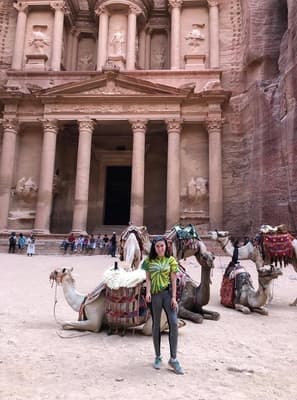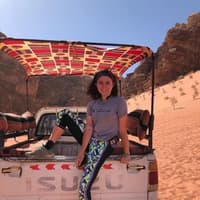Abigail Hawkins
Abigail Hawkins is an alumna of the 2020 CLS Arabic Virtual Institute hosted by Noor Majan Arabic Institute in Muscat, Oman. She’s currently a junior at George Mason University studying global affairs and Arabic planning to graduate in 2022. She plans to use her Arabic language skills in a career in international health diplomacy.
Getting to Know Abby
I am originally from the snowy state of Vermont. When I’m not in class, I love to spend time in Washington, DC going to museums, trying iced coffees from as many cafes as I can, and continuing my annual hunt for the best place to take pictures of the cherry blossoms in the spring.
In high school, I got involved with Model United Nations and fell in love with it; I now serve as the Vice President of George Mason University’s team and as a Director for NHSMUN, the largest high school Model UN conference. I am also involved with my university’s College Diabetes Network in addition to volunteering with several non-profits working to improve healthcare affordability and accessibility, a cause that is near and dear to me.
Language learning is another passion of mine, and in addition to English and Arabic, I have varying degrees of proficiency in three other languages. I studied abroad in Amman, Jordan the summer before I participated in the CLS Arabic program and have also previously studied abroad in Spain and Japan!

Why Arabic?
While attending a conference in high school, I made friends with students on an academic exchange from Iraq who taught me my first Arabic phrase: how to introduce myself (مرحبا !اسمي ابي). Throughout the conference, we talked mostly in English, so as soon as I had the opportunity to take language classes in college, I chose to study Arabic to keep in touch with my friends. The friends I have made throughout my studies have continued to serve as my biggest motivation to keep learning!
Studying Arabic on the CLS Program introduced me to the world of Arabic media. Learning about current events in the Middle East and North Africa from local news sources provides an additional level of nuance and helped me to further my discussions both with friends living in Amman, Muscat, and Beirut, and with friends in Washington, DC, New York, and Boston. Understanding another language also allows me to double my consumption of music, poetry, and movies. My favorite musician at the moment is Yasmine Hamdan from Lebanon. Her music uses expressions from several dialects, which helps expand my vocabulary to communicate across the Arabic-speaking world.
My favorite word in Arabic is ممتاز (amazing). It’s fun to say, and it perfectly sums up my experience learning the language!
I hope to use Arabic daily in my professional career, working in the Middle East to expand access to healthcare internationally, particularly for vulnerable populations like those living in refugee camps and migrant workers. With Arabic-speaking countries such as Jordan and Qatar serving as either major resettlement sites for refugees or hosting a growing migrant worker population, the ability to communicate in both Arabic and English to coordinate health diplomacy efforts is of paramount importance.
Bonding in a Virtual Program
Adapting to the virtual programming format of the CLS Program in 2020 was an adjustment. I logged on to my virtual classroom ten to fifteen minutes early each day, hoping to avoid any technical malfunctions before class began. The rest of the students in my cohort had a similar approach, and quickly the fifteen minutes before class became an opportunity for us to bond—we asked each other about the previous day, met each other’s pets, and complimented efforts to replicate Omani coffee with cardamom. This provided us with an opportunity to truly meet the people we would have studied alongside in different circumstances and feel connected. Better yet, these conversations provided a perfect opportunity to see our progress in Arabic as we were able to have more robust conversations on more nuanced topics of politics and culture as the summer progressed. Our cohort became a supportive, close-knit family of sorts, encouraging each other to push ourselves in our language acquisition efforts and sharing opportunities for further learning in the form of our favorite Arabic songs and television shows. Months after the summer institute ended, our cohort’s WhatsApp group remains active, keeping the opportunity to build on the connections we made during the virtual programming and establish lasting friendships to serve as motivation to continue studying Arabic.



